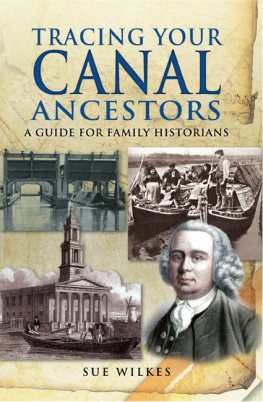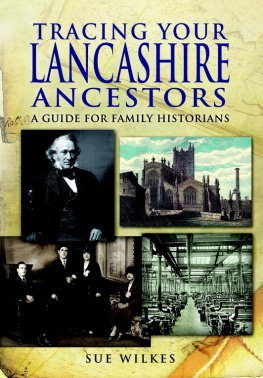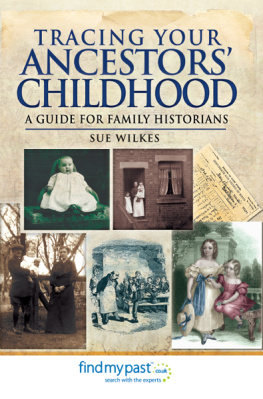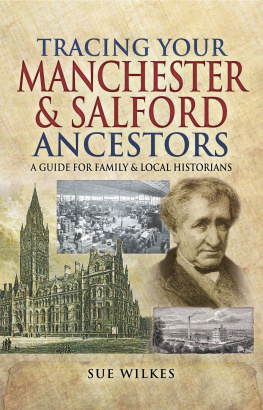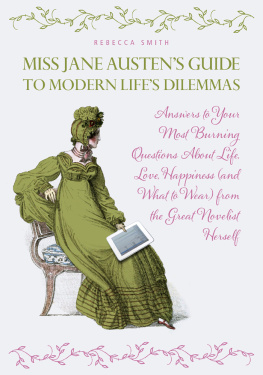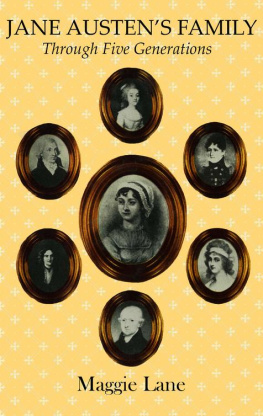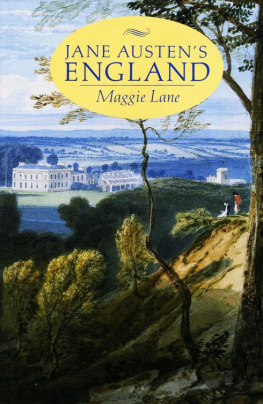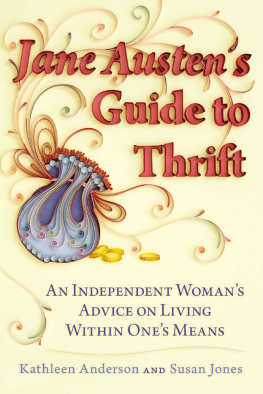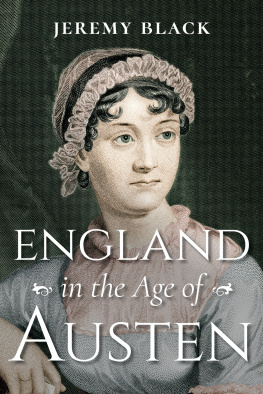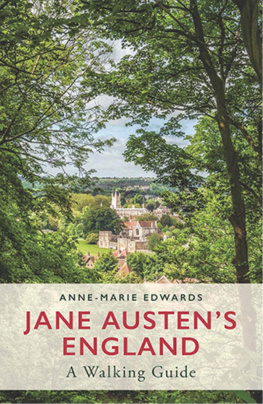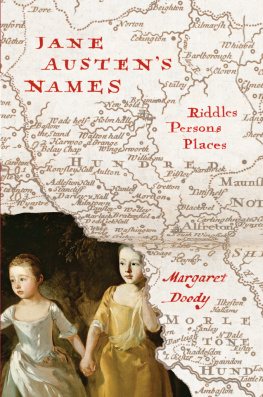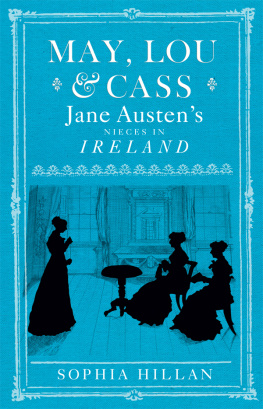A VISITORS GUIDE
TO
JANE AUSTENS
ENGLAND
A VISITORS GUIDE
TO
JANE AUSTENS
ENGLAND
Sue Wilkes
First published in Great Britain in 2014 by
PEN AND SWORD HISTORY
an imprint of
Pen and Sword Books Ltd
47 Church Street
Barnsley
South Yorkshire S70 2AS
Copyright Sue Wilkes, 2014
ISBN 978 1 78159 264 9
The right of Sue Wilkes to be identified
as the author of this work has been asserted by her in accordance
with the Copyright, Designs and Patents Act 1988.
A CIP record for this book is available from the British Library
All rights reserved. No part of this book may be reproduced or
transmitted in any form or by any means, electronic or
mechanical including photocopying, recording or
by any information storage and retrieval system, without
permission from the Publisher in writing.
Printed and bound in England
by CPI Group (UK) Ltd, Croydon, CR0 4YY
Typeset in Times New Roman by
CHIC GRAPHICS
Pen & Sword Books Ltd incorporates the imprints of Pen & Sword
Archaeology, Atlas, Aviation, Battleground, Discovery,
Family History, History, Maritime, Military, Naval, Politics, Railways,
Select, Social History, Transport, True Crime, and Claymore Press,
Frontline Books, Leo Cooper, Praetorian Press, Remember When,
Seaforth Publishing and Wharncliffe.
For a complete list of Pen and Sword titles please contact
Pen and Sword Books Limited
47 Church Street, Barnsley, South Yorkshire, S70 2AS, England
E-mail:
Website: www.pen-and-sword.co.uk
To Nigel, Lizzie and Gareth
Acknowledgements
I would like to thank my editor Jen Newby for her boundless enthusiasm, encouragement and advice. Fellow authors Michelle Higgs and Jane Odiwes help, advice and moral support have been invaluable, too. I am also grateful to Roy and Lesley Adkins for their help.
I would also like to thank archivists David Tilsley of Lancashire Archives, and Lisa Greenhalgh and Linda Clarke of Cheshire Archives and Local Studies. Records held by Lancashire Record Office and Cheshire Archives and Local Studies, to which copyright is reserved, are quoted by kind permission. Thanks are also owed to the Library of Congresss Head of Reference Section, Prints and Photographs Division, Barbara Natanson, for her help regarding illustrations.
I would also like to express my gratitude to Martin Brayne of the Parson Woodforde Society for his aid, and for granting permission to quote from the Woodforde Diary. Any errors in the text are, as ever, my own.
Jane Austens novels, which I have loved and re-read many times since my childhood, were the major inspiration for this book, and I have my parents to thank for my first ever copy of Pride and Prejudice.
Every effort has been made to trace copyright holders for images used in this work. The publishers welcome information on any attributions which have been omitted.
Finally, I must once again thank my husband Nigel, and my children Elizabeth and Gareth, for their unflagging help and support.
Introduction
This book is a visitors guide to Jane Austens England for a gentleman or lady entering the world of the middle or upper classes. Through their eyes you will experience the lifestyles of the men and women in the society which Austen knew and wrote about in her novels.
Austen lived in a highly stratified society, and as you immerse yourself in her world, youll soon become aware of its many inequalities. Most of Englands land, property and riches are concentrated in the hands of a tiny minority; the social order seems ordained by heaven. His Majesty King George III is at the top of the social pyramid, followed by members of the Royal family. The portly Prince of Wales (17621830), the most finished gentleman of Europe, embodies the spirit of the age.
The Prince is notorious for his profligate lifestyle. He keeps mistresses, gambles away terrific sums and spends a fortune on his clothes and horses. The Prince became Regent in 1811 owing to his father George IIIs mental and physical illness (probably porphyria). The King is greatly loved by his people. It is common talk that his repeated bouts of illness have been exacerbated by the behaviour of his spendthrift sons. When his daughter, Princess Amelia, died in 1810, the King suffered a prolonged attack from which he has never really recovered.
Next in the pecking order are aristocrats and nobles, followed by the gentry, comprising baronets, knights of the shire, local squirearchy, and so on. Jane Austen and her family are middle class a richly varied group including clergymen, farmers, professional men, and so on. The lower classes form the bottom stratum of society and many live in abject poverty and hunger.
Everyday life in England is overshadowed by years of conflict with France; the nation was also at war with America from 17751783 and again in 1812. The seemingly endless great war is funded by taxation, which presses heavily on the labouring classes. Charity flows open-handed, however, from well-meaning members of the upper and middle classes like Emma Woodhouse in Austens Emma, who considers it her duty to help those less fortunate.
Meanwhile the haut ton or beau monde enjoy a glittering lifestyle of feasts, balls, gambling and conspicuous consumption fuelled by the long credit (sometimes of several years duration) given by their tradespeople. The elite members of high society have their own rules of style, dress and etiquette not easy for an incomer to master, and woe betide the lady or gentleman who takes a false step.
But the defences of the polite world are not as strong as they seem. Money is the golden key which unlocks societys gates. The rise of industrialism has led to the emergence of affluent entrepreneurs and traders ready to spend their money on acquiring the trappings of gentility, such as the purchase of an estate, like Mr Bingley in Austens Pride and Prejudice. Mr Bingleys 100,000 fortune was amassed by his father in trade. And of course, a single man in possession of a good fortune must be in want of a wife. A good marriage can be a stepping stone to higher things; an imprudent marriage may end in poverty or disgrace.
This book will help you find your feet in Austens England, whether you are a fond parent hoping to launch your sons and daughters into the best society, a young gentleman or lady looking for love, or a traveller keen to enjoy all the amusements that the towns and countryside have to offer. A ladys life is far more confined and constrained than that of a man, and if you belong to the fair sex, youll need a relative or servant to accompany you on your travels.
Peer through the sparkling shop windows in Londons Bond Street; gamble at an exclusive gentlemans club; feel the heat of a crowded ballroom as you try out the latest dance. Hold on tight as your vehicles wheels clatter over the road, while the coachman cracks his whip and sounds his horn. You know youve reached your journeys end as your post-chaise hurtles through a narrow entrance at an alarming speed and deposits you in the hustle and bustle of an inn yard, surrounded by coaches, whinnying horses, chattering servants, and luggage and bandboxes piled high.




